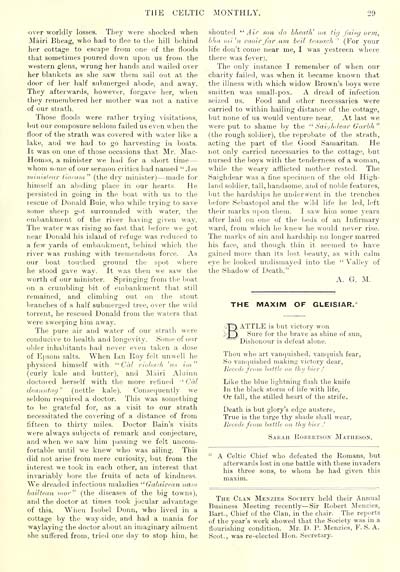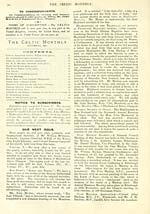Blair Collection > Celtic monthly > Volume 6, 1898
(49)
Download files
Complete book:
Individual page:
Thumbnail gallery: Grid view | List view

THE CELTIC .MONTHLY.
29
over worldly losses. They were shocked when
Miiri Blieag, who had to flee to the hill behind
her cottage to escape from one of the floods
that sometimes poured down upon us from the
western glens, wrung her hands and wailed over
her blankets as she saw them sail out at the
door of her half sul)merged abode, and away.
They afterwards, however, forgave her, when
they remembered her mother was not a native
of our strath.
Those flood.s were rather trying \isitations,
but our composure seldom failed us even when the
floor of the strath was covered with water like a
lake, and we had to go harvesting in boats.
It was on one of those occasions that Mr. Mac-
Hom:is, a minister we had for a short time —
whom Seme of our sermon ciitics had named "Am
■minisleiir tloram " (the dry minister) — made for
himself an abiding place in our hearts. He
persisted in going in the boat with us to the
rescue of Donald Buie, who while trying to save
some sheep got surrounded with water, the
embankment of the river having given way.
The water was rising so fast that before we got
near Donald his island of refuge was reduced to
a few yards of embankment, behind which the
river was rushing with tremendous force. As
our boat touched ground the spot where
he stood gave way. It was then we saw the
worth of our minister. Springing from the boat
on a crumbling bit of embankment that still
remained, and climbing out on the stout
branches of a half submerged tree, over the wild
torrent, he re.scued Donald from the waters that
were sweeping him away.
The pure air and water of our strath were
conducive to health and longevity. Some of our
older inhabitants had never even taken a dose
of Epsom salts. When Ian Roy felt unwell he
physiced himself with " Cal rlolnn-]i 'ii.i im"
(curly kale and butter), and Mairi Aluinn
doctoi ed herself with the more refined •' Cal
deaiudriff'' (nettle kale). Consequently we
seldom required a doctor. This was something
to be grateful for, as a visit to our stratli
necessitated the covering of a distance of from
fifteen to thirty miles. Doctor Bain's visits
were always subjects of remark and conjecture,
and when we saw him passing we felt uncom-
fortable until we knew who was ailing. This
did not arise from mere curiosity, but from the
interest we took in each other, an interest tiiat
invariably bore the fruits of acts of kindness.
We dreaded infectious maladies "Galairfa7i nam
bailtedn iiiof" (the diseases of the big towns),
and the doctor at times took jocular advantage
of this. W^iien Isobel Donn, who lived in a
cottage by the way-side, and had a mania for
waylaying the doctor about an imaginary ailment
she suft'ered from, tried one day to stop him, lie
shouted '■'Air son do blieuth' mi tiij fdisy or»i,
blia )jii'n raoir fur am heil ti'usacli ' (For your
life don't come near me, I was yestreen where
there was fever).
The only instance I remember of when our
charity failed, was when it became known that
the illness with which widow Brown's boys were
smitten was small-pox. A dread of infection
seized us. Food and other necessaries were
carried to within hailing distance of the cottage,
but none of us would venture near. At last we
were put to shame by the " .Sai'jhJedr Gurbh"
(the rough soldier), the reprobate of the strath,
acting the part of the Good Samaritan. He
not only carried necessaries to the cottage, but
nursed the boys with the tenderness of a woman,
while the weary afflicted mother rested. The
Saighdear was a tine specimen of the old High-
land soldier, tall, handsome, and of noble features,
but the hardships he underwent in the trenches
before Sebastopol and the wild life he led, left
their marks upon them. I saw him some years
after laid on one of the beds of an Infirmary
ward, from which he knew he would never rise.
The marks of sin and hardship no longer marred
his face, and tliough thin it seemed to have
gained more than its lost beauty, as with calm
eye he looked undismayed into tlie "Valley of
the Shadow of Death."
A. G. M.
THE MAXIM OF GLEISIAR.
,T^^ ATTLE is but victory won
; pj, Sure for the brave as shine of sun.
Dishonour is defeat alone.
Thou who art vanquished, vancjuish fear,
So vanquished makinp; victory dear,
Recede from Jmffle on ihij hier .'
Like the blue lightning flash the knife
In the black storm of life with life.
Or tall, the stilled heart of the strife.
Death is but glory's edge austere,
True is the targe thy shade shall wear,
Ill-cede from battle on tliij hier .'
Sarah Robert.son Matheson.
A Celtic Chief who defeated the Romans, but
afterwards lost in one battle with these invaders
hia three sons, to whom he had given this
maxim.
The Clan Menzies Society held their Annual
Business Meeting recently — Sir Robert Menzies,
Bart., Chief of the Clan, in the chair. The reports
of the year's work showed that the Society was in a
flourishing condition. Mr. D. P. Menzies, F. S. A.
Scot., was re-elected Hon. Secretary.
29
over worldly losses. They were shocked when
Miiri Blieag, who had to flee to the hill behind
her cottage to escape from one of the floods
that sometimes poured down upon us from the
western glens, wrung her hands and wailed over
her blankets as she saw them sail out at the
door of her half sul)merged abode, and away.
They afterwards, however, forgave her, when
they remembered her mother was not a native
of our strath.
Those flood.s were rather trying \isitations,
but our composure seldom failed us even when the
floor of the strath was covered with water like a
lake, and we had to go harvesting in boats.
It was on one of those occasions that Mr. Mac-
Hom:is, a minister we had for a short time —
whom Seme of our sermon ciitics had named "Am
■minisleiir tloram " (the dry minister) — made for
himself an abiding place in our hearts. He
persisted in going in the boat with us to the
rescue of Donald Buie, who while trying to save
some sheep got surrounded with water, the
embankment of the river having given way.
The water was rising so fast that before we got
near Donald his island of refuge was reduced to
a few yards of embankment, behind which the
river was rushing with tremendous force. As
our boat touched ground the spot where
he stood gave way. It was then we saw the
worth of our minister. Springing from the boat
on a crumbling bit of embankment that still
remained, and climbing out on the stout
branches of a half submerged tree, over the wild
torrent, he re.scued Donald from the waters that
were sweeping him away.
The pure air and water of our strath were
conducive to health and longevity. Some of our
older inhabitants had never even taken a dose
of Epsom salts. When Ian Roy felt unwell he
physiced himself with " Cal rlolnn-]i 'ii.i im"
(curly kale and butter), and Mairi Aluinn
doctoi ed herself with the more refined •' Cal
deaiudriff'' (nettle kale). Consequently we
seldom required a doctor. This was something
to be grateful for, as a visit to our stratli
necessitated the covering of a distance of from
fifteen to thirty miles. Doctor Bain's visits
were always subjects of remark and conjecture,
and when we saw him passing we felt uncom-
fortable until we knew who was ailing. This
did not arise from mere curiosity, but from the
interest we took in each other, an interest tiiat
invariably bore the fruits of acts of kindness.
We dreaded infectious maladies "Galairfa7i nam
bailtedn iiiof" (the diseases of the big towns),
and the doctor at times took jocular advantage
of this. W^iien Isobel Donn, who lived in a
cottage by the way-side, and had a mania for
waylaying the doctor about an imaginary ailment
she suft'ered from, tried one day to stop him, lie
shouted '■'Air son do blieuth' mi tiij fdisy or»i,
blia )jii'n raoir fur am heil ti'usacli ' (For your
life don't come near me, I was yestreen where
there was fever).
The only instance I remember of when our
charity failed, was when it became known that
the illness with which widow Brown's boys were
smitten was small-pox. A dread of infection
seized us. Food and other necessaries were
carried to within hailing distance of the cottage,
but none of us would venture near. At last we
were put to shame by the " .Sai'jhJedr Gurbh"
(the rough soldier), the reprobate of the strath,
acting the part of the Good Samaritan. He
not only carried necessaries to the cottage, but
nursed the boys with the tenderness of a woman,
while the weary afflicted mother rested. The
Saighdear was a tine specimen of the old High-
land soldier, tall, handsome, and of noble features,
but the hardships he underwent in the trenches
before Sebastopol and the wild life he led, left
their marks upon them. I saw him some years
after laid on one of the beds of an Infirmary
ward, from which he knew he would never rise.
The marks of sin and hardship no longer marred
his face, and tliough thin it seemed to have
gained more than its lost beauty, as with calm
eye he looked undismayed into tlie "Valley of
the Shadow of Death."
A. G. M.
THE MAXIM OF GLEISIAR.
,T^^ ATTLE is but victory won
; pj, Sure for the brave as shine of sun.
Dishonour is defeat alone.
Thou who art vanquished, vancjuish fear,
So vanquished makinp; victory dear,
Recede from Jmffle on ihij hier .'
Like the blue lightning flash the knife
In the black storm of life with life.
Or tall, the stilled heart of the strife.
Death is but glory's edge austere,
True is the targe thy shade shall wear,
Ill-cede from battle on tliij hier .'
Sarah Robert.son Matheson.
A Celtic Chief who defeated the Romans, but
afterwards lost in one battle with these invaders
hia three sons, to whom he had given this
maxim.
The Clan Menzies Society held their Annual
Business Meeting recently — Sir Robert Menzies,
Bart., Chief of the Clan, in the chair. The reports
of the year's work showed that the Society was in a
flourishing condition. Mr. D. P. Menzies, F. S. A.
Scot., was re-elected Hon. Secretary.
Set display mode to: Large image | Transcription
Images and transcriptions on this page, including medium image downloads, may be used under the Creative Commons Attribution 4.0 International Licence unless otherwise stated. ![]()
| Early Gaelic Book Collections > Blair Collection > Celtic monthly > Volume 6, 1898 > (49) |
|---|
| Permanent URL | https://digital.nls.uk/75855322 |
|---|
| Shelfmark | Blair.58 |
|---|---|
| Additional NLS resources: | |
| Attribution and copyright: |
|
| Description | A selection of books from a collection of more than 500 titles, mostly on religious and literary topics. Also includes some material dealing with other Celtic languages and societies. Collection created towards the end of the 19th century by Lady Evelyn Stewart Murray. |
|---|
| Description | Selected items from five 'Special and Named Printed Collections'. Includes books in Gaelic and other Celtic languages, works about the Gaels, their languages, literature, culture and history. |
|---|

